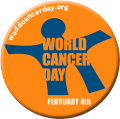
As World Cancer Day rolls around again, it’s striking—and frankly, more than a little dispiriting for us cancer educators—to see how little people know about the disease.
Not about the actual disease—for cancer is a complex condition that baffles even researchers and oncologists—but about the risk factors that influence whether we get cancer or not.
A survey commissioned by American Institute for Cancer Research (AICR), published today, revealed that many Americans still cling to the myth that they are powerless before cancer. The full details of the survey can be found here, but the section I’d like to examine more closely concerns diet.
Asked whether “diet affects people’s risk of getting cancer,” just over half of Americans surveyed (58%) knew that they can indeed cut cancer risk with a healthy diet, but many either disagreed (11%) or could not make up their minds (31%).
When asked whether “body weight affects people’s risk of getting cancer,” the answer was “alarmingly low,” according to the AICR: less than half (41%) of those surveyed knew that body weight has an impact on cancer risk. One in 5 (20%) disagreed, while 38% could not make up their mind.
UK respondents surveyed by the World Cancer Research Fund International were even less informed: 49% of people polled said they didn’t know that diet can affects people's risk of getting cancer. Two thirds of the 2,000 British adults polled did not know about the links between cancer and physical activity and 59% were unaware of the correlation between cancer and body weight.
Lastly, more than a third of Brits polled (34%) believe that the chances of getting cancer are mainly due to a family history of the disease, even though only 5-10% of cancers are linked to genes.
“On World Cancer Day 2014 it’s very alarming to see that such a large number of people don’t know that there’s a lot they can do to significantly reduce their risk of getting cancer," said Amanda McLean, the World Cancer Research Fund’s General Manager.
In fact, approximately 374,000 cases of the most common cancers could be prevented each year in the U.S. by eating a healthy diet, being physically active and staying a healthy weight, the AICR estimates. That means about one in three cancers would never have to happen.
Excess body fat is a cause of seven cancers, including post-menopausal breast, endometrial and esophageal cancers. Carrying excess body fat causes an estimated 117,000 U.S. cancer cases each year, according to the AICR. Meanwhile, research has shown that 30 minutes of daily moderate activity can help reduce cancer risk independent of weight.
Mediterranean diet to the rescue
You don’t have to become a cancer specialist to lower your risk of developing the disease. All you need to do is to adopt a Mediterranean diet and a moderate exercise routine (for instance, 30 minutes a day of gentle walking), and you will lower not only your chances of developing cancer, but also heart disease, diabetes, osteoporosis, and various other diseases of “civilization.”
Again and again studies show that the Mediterranean diet lowers the risk of cancer. There are various ways in which this way of eating works against the development and spread of cancer cells.
1. Antioxidant, anti-inflammatory, and anti-angiogenic compounds: The Mediterranean diet brims with foods that have antioxidant properties, such as vegetables, oily fish, legumes, fruits, spices, herbs, nuts, seeds, and of course olive oil. Antioxidants protect our cells, and the genetic information inside them, from free-radical attacks that could otherwise lead to cancerous cell changes.
Inflammation, meanwhile, is another factor that can promote the development and growth of cancer, and many Mediteranean foods contain powerful anti-inflammatory compounds (read more about inflammation and cancer in this excellent article by integrative oncologist Brian Lawenda M.D.).
Lastly, angiogenesis—the development of new blood vessels that tumors need in order to thrive and grow—can be slowed or halted by eating foods that abound in the Mediterranean diet, such as berries, citrus fruit, grapes, kale, artichokes, squash, parsley, garlic, tomato, and olive oil (find out more about antiangiogenic foods in this brilliant TED talk by William Li M.D. of the Angiogenesis Foundation).
Red wine—the favorite dinnertime beverage in the Mediterranean region—contains powerful antioxidants too, but since alcohol is thought to promote cancer, I recommend abstinence or, at best, extremely moderate red wine consumption to anyone wishing to lower their cancer risk—at the very most, one glass per day for women and two glasses for men, in line with the AICR’s recommendation.
2. Low glycemic impact: As is increasingly understood, carbohydrates that push our blood glucose levels sharply higher also increase our risk of developing cancer and can fuel the growth of tumors. This is not only because sugar is a favorite source of energy for cancer cells, but also because every time our blood-sugar levels rises, our body produces insulin and insulin-like growth factor (IGF-1), two hormones that fuel the growth and spread of tumors.
This doesn’t mean you can’t ever eat carbohydrates; however, it’s best to choose those that are converted into blood glucose slowly, such as low-glycemic fruits and vegetables and whole grains (ideally fermented)—and to avoid those that are released rapidly into the blood stream, such as candy and sweetened drinks, and anything made with refined flours, such as cookies, cakes, and convenience snacks.
To further lower the glymemic impact of the carbohydrates you consume, it’s important to eat protein and fat together with starchy foods, which slows down the rate at which they are converted into blood glucose. The presence of fiber and acids—for instance, a salad dressing containing lemon or red wine vinegar—further reduces the glycemic impact of carbohydrates.
The Mediterranean diet has a moderate glycemic impact: It is rich in vegetable fibers, healthy fats, proteins, slowly digested whole grains and blood-sugar-balancing micronutrients, all of which work together to produce steady blood sugar and insulin levels.
3. Healthy fats: While the “standard American diet” (SAD) is dominated by omega-6 fats that fuel weight gain, inflammation and cancer cell growth, the Mediterranean diet contains more anti-inflammatory, anti-cancer, omega-3 fatty acids (found in oily fish, walnuts, flax seeds, green leafy vegetables and the eggs, dairy and meat of grass-fed animals) and relatively fewer omega-6 fats. Moreover, the olive oil consumed around the Mediterranean basin provides healthy monounsaturated fatty acids as well as antioxidant and anti-inflammatory polyphenols thought to have significant anti-cancer effects.
4. Stress-free and life-affirming: Unlike other health-food regimes—for instance, vegan, low-fat, raw-food, low-carb or Paleo diets—the Mediterranean diet does not require you to remove entire food groups from your diet, or to spend hours preparing meals. This makes it a simple, stress-free, and guilt-free way of eating that’s easy to maintain over the long term. While "food angst" has not been shown to cause cancer, chronically elevated stress levels are linked to a wide range of health problems, including cancer, so you might as well choose a slow-stress diet and have one less thing to worry about.
Eating a Mediterranean diet does require a modest investment of time into shopping and cooking, but if you can learn to see these as relaxing or creative activities, rather than dreaded chores, preparing meals and sharing these with people you love can become a source of joy and positivity in your life. Indeed, for some of my clients, cooking the daily meal has become a form of mindfulness practice they find refreshing and life-affirming.
(c) Conner Middelmann-Whitney. Conner is a nutrition coach and cookbook writer specializing in the Mediterranean diet. She is the author of Zest for Life: The Mediterranean Anti-Cancer Diet. Conner offers Mediterranean diet coaching (online and in-person) and publishes Everyday Mediterranean, a recipe and meal-planning service for busy people wishing to "Mediterraneanize" their diets. For more information about her work, please visit her website, www.nutrelan.com.




